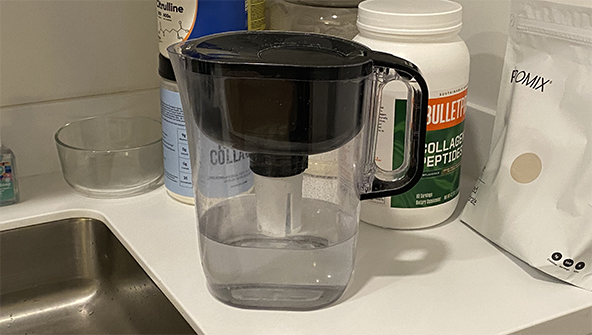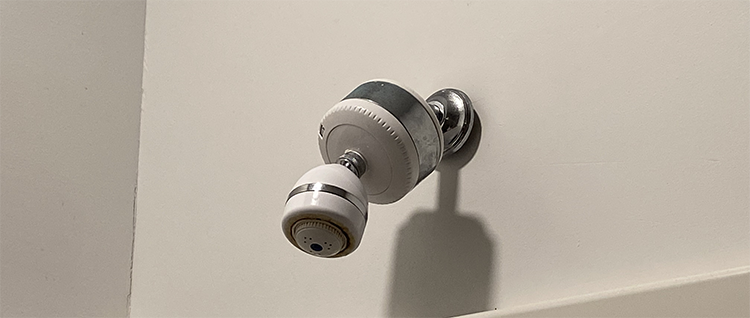
Tap water can contain bacteria, viruses, heavy metals and hormone-disrupting plasticizing chemicals like bisphenol A (BPA). In our increasingly polluted modern environment, using a water filter can help remove as many contaminants as possible from drinking, cooking and shower water.
But are any water filters actually proven in studies to reduce contaminants? Which water filter brands are most effective? What contaminants should people be aware of? And are any shower filters proven to work?
In this article we'll answer all of these questions and more, as we analyze studies on water filters to determine which successfully reduced the most contaminants.
We'll explain whether or not tap water is really a health concern, and share our thoughts about whether or not shower filters are worth it.
Finally, we'll recommend one countertop water filter, one whole-house water filter and one shower filter.
Key takeaways:
- Tap water can be significantly contaminated in the US
- Brita is proven effective, and is the best value
- Aquasana is our top whole-house water filter pick (most effective)
Is Tap Water Actually Contaminated?
A few categories of contaminants in tap water that consumers should be most conscious of are heavy metals, estrogenic plastic chemicals and pesticides.
Heavy metals like lead, arsenic and mercury are present in municipal tap water in many jurisdictions.
Although the limits are regulated in the US by the Environmental Protection Agency (EPA), any amount of heavy metal intake is toxic, so limiting exposure as much as possible may be beneficial for health.
Pesticides are also present in tap water, although thanks to efficient water treatment facilities in the US, their levels may actually be lower in tap water than in rainwater, based on environmental studies conducted in New York State.
We also know from medical research that hormone-disrupting chemical bisphenol A (BPA) is present in tap water in many countries.
Tap water is safe to drink in most parts of the US, but it seems logical for any consumer who can afford it to invest in a research-backed water filter to reduce contaminant intake.
An excellent exposé by Vox highlighted how a particular type of contaminant called PFAS has become a problem in much of America's water supply, and this is just one type of contaminant that can exist in tap water:
Best Countertop Water Filter

Brita Soho is our top pick for an affordable and effective countertop water filter.
It's been shown in studies conducted by the Environmental Working Group (an independent research firm) to significantly reduce nitrate, heavy metals and PFAS ("forever chemicals") levels.
Brita Soho reduced 100% of the chlorine, 100% of the mercury, 100% of the cadmium and 100% of the lead from the test water, and reduced arsenic by 15.4%.
Other independent tests have shown that Brita Soho reduced microplastics in tap water by 100%.
It's currently retailing at under $50 with a replacement filter.
This ends up costing well under $1 per day for clean drinking water for the whole house.

As the author of this article, I've used a countertop Brita filter for years. The water tastes "purer" and I use it for everything from drinking water to tea to cooking water.
Best Whole-House Water Filter

Aquasana Rhino Whole-House Water Filter is our top whole-house water filtration pick.
When you install a whole-house filter, it filters water in all taps and all showers throughout the house, so it's the most thorough way to remove contaminants.
Aquasana's device is independently tested and certified to reduce toxins, and we haven't come across any tested shower filters, so this seems to be the most effective way to guarantee a reduction of chlorine and chloramine exposure in the shower.
Whole-house water filters have a high upfront cost, but are relatively cost-efficient over long periods of time because of how long they last.
The Aquasana Rhino filter costs $1,998 at the time of updating this article, but comes with a warranty and is guaranteed to last for 10 years.
This equates to a cost of under $1 per day.
This makes the whole-house filter actually cheaper than purchasing separate countertop and shower water filters over a 10 year period.
Best Shower Water Filter

Many consumers are unaware of this, but exposure to contaminants in water is likely higher during a shower than from drinking water.
This sounds counterintuitive, because drinking water is directly ingested, but chlorine in shower water reacts with organic matter at high temperatures and forms trihalomethanes such as chloroform.
This is proven in medical research, and we know chloroform to be carcinogenic (cancer-causing). These harmful compounds are inhaled and absorbed through the skin during hot showers.
Unfortunately, independent labs haven't tested the effectiveness of different shower filters at the time of updating this article, and no shower filter companies we researched published any testing of their products at all.
Sprite SL2-CM Shower Filter is our top shower filter pick because it's easy-to-install (we've used it personally), affordable (under $25 currently) and has great reviews.
We would prefer to recommend a shower filter based on test results, but the shower filter industry seems behind the drinking water filter industry in this regard. If a shower filter brand emerges with tests proving its efficacy, we will update this article and recommend it.

As the author of this article, I've used the Sprite shower filter for nearly a decade. I have to replace the showerhead every few years due to rust and/or mold, and replace the filters about twice a year.
I can really tell the difference when a new shower filter is installed. I can't smell the chlorine in the water anymore.




























































